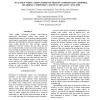Free Online Productivity Tools
i2Speak
i2Symbol
i2OCR
iTex2Img
iWeb2Print
iWeb2Shot
i2Type
iPdf2Split
iPdf2Merge
i2Bopomofo
i2Arabic
i2Style
i2Image
i2PDF
iLatex2Rtf
Sci2ools
ICIP
2004
IEEE
2004
IEEE
Scalable video coding based on motion-compensated temporal filtering: complexity and functionality analysis
Video coding techniques yielding state-of-the-art compression performance require large amount of computational resources, hence practical implementations, which target a broad market, often tend to trade-off coding efficiency and flexibility for reduced complexity. Scalable video coding instead, not only provides seamless adaptation to bit-rate variation, but also allows the end user to trim down the resources he needs to perform realtime decoding by limiting the process to a subset of the original content. Hence, by choosing the quality, framerate and/or resolution of the reconstructed sequence, each decoder can meet its hardware limitations without affecting the encoding process of the media provider. This paper proposes a preliminary analysis of the memoryaccess behavior of a fully scalable video decoder and investigates the capability of selecting the operational settings in order to adapt to the available hardware resources on the target device.
Available Hardware Resources | Framerate And/or Resolution | ICIP 2004 | Image Processing | Scalable Video Decoder | Trade-off Coding Efficiency | Video Coding Techniques |
Related Content
| Added | 24 Oct 2009 |
| Updated | 24 Oct 2009 |
| Type | Conference |
| Year | 2004 |
| Where | ICIP |
| Authors | Fabio Verdicchio, Yiannis Andreopoulos, Tom Clerckx, Joeri Barbarien, Adrian Munteanu, Jan Cornelis, Peter Schelkens |
Comments (0)

